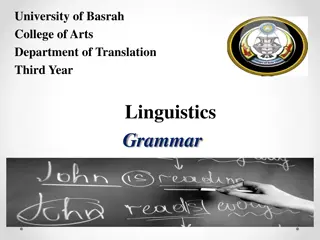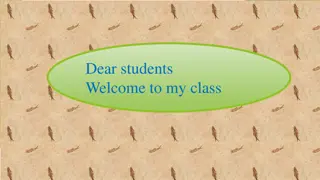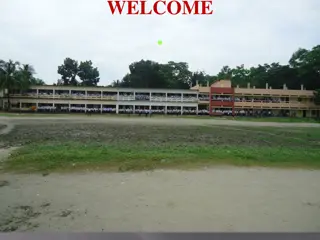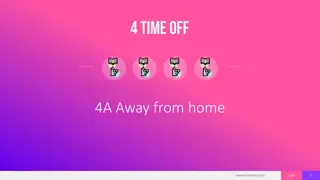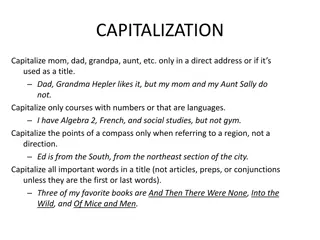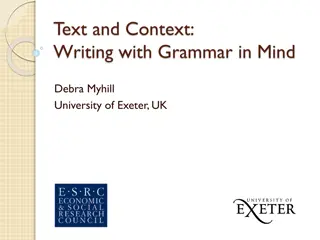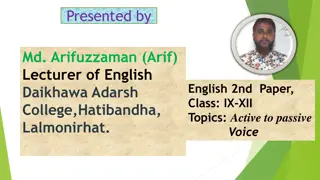Mastering Narration: Rules and Examples in English Grammar
This educational content covers the topic of narration in English grammar, focusing on direct and indirect speech, rules for changing direct speech into indirect, and examples to illustrate the concepts. It includes information on teacher identity, learning outcomes, narration types, and practical exercises to enhance understanding.
Uploaded on Aug 25, 2024 | 6 Views
Download Presentation

Please find below an Image/Link to download the presentation.
The content on the website is provided AS IS for your information and personal use only. It may not be sold, licensed, or shared on other websites without obtaining consent from the author.If you encounter any issues during the download, it is possible that the publisher has removed the file from their server.
You are allowed to download the files provided on this website for personal or commercial use, subject to the condition that they are used lawfully. All files are the property of their respective owners.
The content on the website is provided AS IS for your information and personal use only. It may not be sold, licensed, or shared on other websites without obtaining consent from the author.
E N D
Presentation Transcript
TEACHERS IDENTITY Kaniz fatema Ass:teacher Rahimpur high school Lalpur,natore
TOPIC Narration Narration Class nine Sub: English 2nd Part
Learning Outcomes By the end of the lesson, the learners will be able to 1. Learn about the definatoion of Narration. 2.Know about the rules of Narration. 3.Learn about the kinds of Narrtion. 4.Practise the exercise of Narration.
Narration Direct Narration Indirect Narration Speeched by speaker himself Speeched by Others
She said to me, I was ill. Direct speech Indirect speech She told me that she had been ill.
Two parts in narration He said to me, I am fine . Reporting verb Reported Speech For example: He says, I am well . He said, I write a novle . She said, I am going to school . He said, I have done my duty . N.B. Here the sentence outside is called reporting verb and the sentence in comma and inverted comma is called reported speech.
RULES FOR CHANGING DIREST SPEECH INTO INDIRECT 1/ We use a linker before the indirect speech : 2/ The pronouns are change according to sense : 3/ If the reporting verb is in the past Tense , we must make the following changes :
Sentences connector s That If/WH Use this verb in lieu of reporting verb (said to) Assertive Interrogative told/said asked To/that Imperative Ordered/requested/advised/forbade/propose d/said Prayed/wished Exclaimed with joy/sorrow/wonder Optative Exclamatory That that Direct Indirect : Abir told me that he was fine. : Abir said to me, He is fine. Direct : She said to me , Are you reading the book? Indirect : She asked me if I was reading the book. Direct : The teacher said to students, Sit down . Indirect : The teacher ordered the students to sit down.
Direct : Father said to his son, May Allah help you. Indirect : Father prayed to his son that Allah might help him. Direct : The boy said to us, How fine the bird it is! Indirect : The boy exclaimed with joy that it was very fine bird. Direct : The teacher said to students, Sit down . Indirect : The teacher ordered the students to sit down. Direct: The hare said to the tortoise , Let us run a race . Indirect: The hare proposed that they should run a race. Direct: He said, let me come in. Indirect: He requested that he might come in.
Changing person Person Nominative Case Objective Case Possessive Case 1st Person I we You Me us you My Our your 2nd Person He She They It Him Her Them it His Her Their its 3rd Person R.S 1stPerson R.V Speaker Person Change 1. Direct: Direct : Kamal said to me , I am drawing the picture. Indirect : Kamal told me that he was drawing the picture. 2. R.S 2nd Person R.V object Person Change Direct : I said to him, you went market. Indirect : I told him that he had gone market.
3. 3rd Person Change Direct : She said , They are reading a novel. Indirect : She said that they were reading novel.
Changing Tense Direct Narration Present Indefinite Present Continuous Present Perfect Present Perfect Continuous Past Indefinite Past Continuous Past Perfect Past Perfect Continuous : He said to me, I go to Dhaka. Indirect Narration Past Indefinite Past Continuous Past Perfect Past Perfect Continuous Past Perfect Past perfect Continuous No Change No Change Direct Indirect : He told me that he went to Dhaka. : Jamal said to me, I am catching fish. Direct Indirect : Jamal told me that he was catching fish.
Direct : The boy said to her, Are you reading the book? Indirect :The boy asked her if she was reading the book. Direct : The teacher said , Do the work . Indirect : The teacher ordered to do the work . Direct : He says to me, You knew the matter. Indirect : He tells me that I had known the matter.
tense , the tense of the Direct speech is not changed at all. RULE: (2) IN CASE OF A HABITUAL TRUTH OR ETERNAL TRUTH, NO CHANGE OF TENSE IS REQUIRED. DIRECT : BIMAL SAID, I WALK FOR AN HOUR EVERY MORNING INDIRECT: BIMAL SAID THAT HE WALKS FOR AN HOUR EVERY MORNING.
How to change tense/verbs from Direct to Indirect speech Direct Am/is/are Was/were Shall/will Has/have/did Can/may Must Present indefinite Past indefinate Indirect Was/were Had been Should/would Had + past participle Could/might Had to Past indefinite Past perfect
Chaging Modal Auxilay verb Direct Narration Indirect Narration can may could might shall will must Need Dare should would Had to Needed Dared Direct: The girl said , I will do the work. Indirct : The girl said that she would do the work. Direct: Mother said to her son, May Allah help you. Indirect: Mother prayed her son that Allah might help him. Direct: Mother said to his son, You must take it. Indirect: Mother told his son that he had to take it.
Changing these words in this way Direct Indirect Direct Indirect Here There Thus So Now Ago This Then Before That Tomorrow Yesterday Last night / week / month /year To night Next week The next day The Previous day The Previous night / week /month /year That night The following week These Come Those Go Direct: The boy said to me , I saw him yesterday. Indirect: The boy told me that he had seen him the previous day. Direct: Aunt said to me, When did you go here. Indirect: Aunt asked me when I had gone there. Direct: I said to him, Will you come tomorrow?
Pair work Direct: He says, I am student. Indirect: He says that he was student. Direct: Nishat says, I am going to school. Indirect: Nishat says that she was going to school. Direct: Runu will say, She is a good mother. Indirect:Runu will say that she is a good mother. Direct: The teacher said to me, will you go to market? Indirect: The teacher asked me if I should go to market. Direct: Father said to me, Have you written the novel? Indirect: Father asked me if I had written the novel. Direct: The teacher said to me, Always speak the truth. Indirect: The teacher advised me to speak the truth always. Direct: Nahid said, Do not quarrel with him. Indirect: Nahid forbid not to quarrel with him. Direct: He said, Long live our Prime minister. Indirect: He prayed that their president might live long. Direct: Mother said, May Allah help you. Indirect: Mother prayed that Allah might help me. Direct: They said, How beautiful the bird is! Indirect: They exclaimed with joy thatthe bird wasvery beautiful
Home work Change the following speech from direct to indirect The teacher said to me, The earth moves round the sun. Father said to his son, I want to make you a man of truth. He said to me, I was there in 1990. Practice makes a man perfect. Newspaper is a store house of knowledge, said the Principal. 1. 2. 3. 4. 5.






